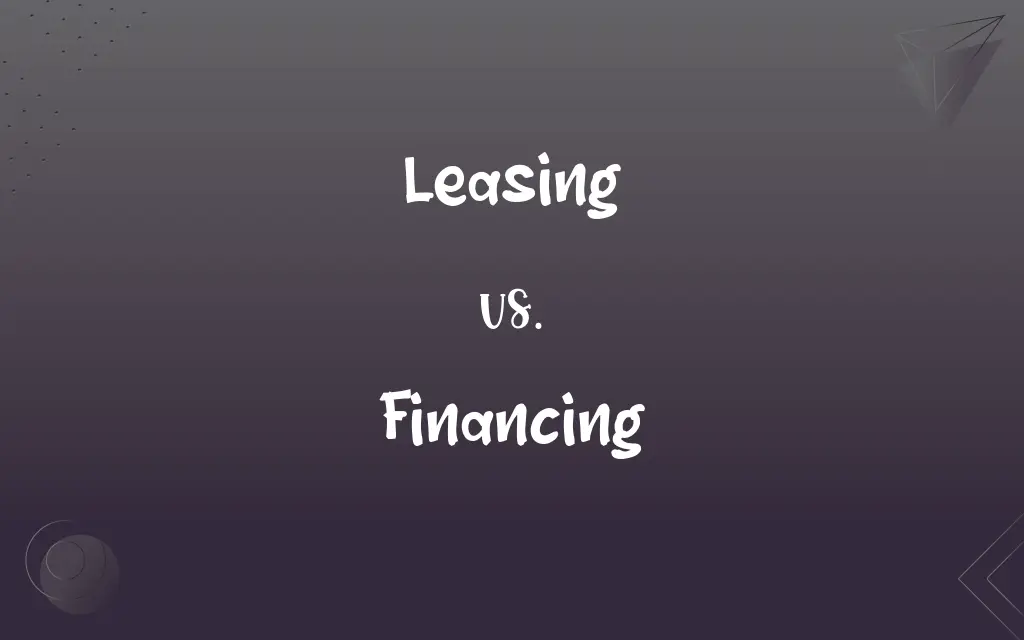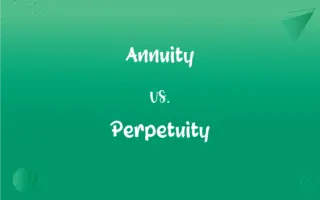Leasing vs. Financing: What's the Difference?
Edited by Harlon Moss || By Janet White || Published on November 12, 2023
Leasing: Paying for use; Financing: Paying to own.

Key Differences
Leasing is akin to renting. One pays for the use of an asset for a specified period. The lessee enjoys the asset without the burden of ownership. Financing: Financing is the process of paying for an asset over time. The borrower eventually owns the asset outright. It involves a loan and interest payments.
Often involves lower monthly payments compared to financing. It's attractive for short-term use. Financing: Monthly payments are generally higher, reflecting a path to ownership. Ideal for long-term asset retention.
The lessee doesn't build equity in the asset. It's a temporary arrangement, often with the option to buy later. Financing: Each payment builds equity. It's an investment in a tangible asset.
Often includes maintenance provisions, reducing upkeep worries for the lessee. Financing: The owner is responsible for all maintenance, adding to the long-term cost.
At the end of the lease, one can easily switch to a newer model or different asset. Financing: The borrower can sell or keep the asset after paying off the loan.
ADVERTISEMENT
Comparison Chart
Ownership
Temporary use, no ownership
Aimed at ownership
Payments
Generally lower monthly payments
Higher payments, builds equity
Duration
Short-term arrangement
Long-term commitment
Maintenance Responsibility
Often included in lease
Owner’s responsibility
End of Term Options
Return, renew, or buy
Owns asset outright
ADVERTISEMENT
Equity
No equity built
Builds equity
Flexibility
Easier to switch assets
Less flexible
Leasing and Financing Definitions
Leasing
Paying for the use, not ownership.
Leasing equipment is cost-effective for their startup.
Financing
Payment plan for ownership.
They opted for financing the car over paying cash upfront.
Leasing
Fixed-term usage agreement.
Leasing the yacht for the summer was a luxurious choice.
Financing
Providing funds for purchase.
Financing the house enabled them to become homeowners.
Leasing
Temporary possession of property.
Leasing the apartment suited her short-term job placement.
Financing
Borrowing money with repayment terms.
Financing the renovation was manageable with their savings.
Leasing
Rental arrangement with the option to buy.
They considered leasing the photocopier with a buyout option.
Financing
Loan arrangement for asset acquisition.
Financing her education was a wise investment.
Leasing
Contractual agreement for using an asset.
They entered a leasing agreement for the new car.
Financing
Method of spreading out payments.
Financing the equipment helped maintain their cash flow.
Leasing
The act of lying.
Financing
The act of providing or raising funds or capital.
Leasing
A lie; a falsehood.
Financing
Funds or capital provided by investors or lenders.
Leasing
(archaic) A lie; the act of lying, falsehood.
Financing
Present participle of finance
Leasing
Gerund of lease
Financing
A transaction that provides funds for a business.
The successive equity financings were at higher and higher valuations.
Leasing
Present participle of lease
Financing
The act of financing
Leasing
The act of lying; falsehood; a lie or lies.
Thou shalt destroy them that speak leasing.
Blessed be the lips that such a leasing told.
FAQs
Are leasing payments lower than financing payments?
Generally, leasing payments are lower than financing payments.
Do I own the asset at the end of a financing agreement?
Yes, you own the asset outright at the end of a financing agreement.
What is leasing?
Leasing is a contractual agreement to use an asset for a set period without owning it.
What is financing?
Financing is the process of paying for an asset over time, leading to ownership.
Do I own the asset at the end of a lease?
No, you don’t own the asset at the end of a lease unless you choose to buy it.
Is financing a long-term commitment?
Yes, financing is typically a long-term commitment.
Does financing build equity?
Yes, financing builds equity in the asset.
Can I lease with an option to buy?
Yes, many leasing agreements come with an option to purchase.
Is leasing good for short-term needs?
Yes, leasing is ideal for short-term use.
What happens at the end of a lease?
You can return, renew the lease, or buy the asset.
Is maintenance included in leasing?
Often, but not always. It depends on the lease terms.
Are lease payments tax-deductible?
In many cases, lease payments can be tax-deductible.
Can I lease any type of asset?
Many assets are leasable, but it depends on the provider.
Can I sell the asset I’m financing?
Yes, once you own it, you can sell it.
Is a down payment required for financing?
Often, but not always; it varies by lender and asset.
Who is responsible for maintenance in financing?
The owner is responsible for maintenance in a financing arrangement.
Can I terminate a lease early?
It depends on the lease terms, but there may be penalties.
Can I build equity with leasing?
No, you don’t build equity with leasing.
Is financing interest tax-deductible?
It depends on the asset and usage; sometimes, it is.
Can I pay off financing early?
Often, yes, but check for any prepayment penalties.
About Author
Written by
Janet WhiteJanet White has been an esteemed writer and blogger for Difference Wiki. Holding a Master's degree in Science and Medical Journalism from the prestigious Boston University, she has consistently demonstrated her expertise and passion for her field. When she's not immersed in her work, Janet relishes her time exercising, delving into a good book, and cherishing moments with friends and family.
Edited by
Harlon MossHarlon is a seasoned quality moderator and accomplished content writer for Difference Wiki. An alumnus of the prestigious University of California, he earned his degree in Computer Science. Leveraging his academic background, Harlon brings a meticulous and informed perspective to his work, ensuring content accuracy and excellence.







































































